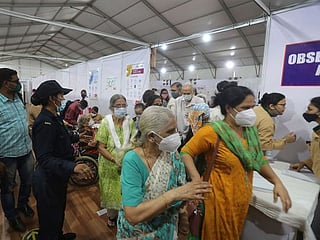Vaccine nationalism only helps the virus
A year since the WHO declared a pandemic, nations must join forces to combat it

As the production and distribution of Covid-19 vaccines gathers pace around the world, countries today face a major dilemma: what to prioritise — citizens and residents or the international community?
That question has taken on a critical dimension as poorer countries wait for their turn in getting the Covid-19 jab and more prosperous nations secure the bulk of global supplies, with manufacturers mostly seen to be offering the vaccines to the highest bidders.
This so-called vaccine nationalism — where countries prioritise their own vaccine needs — might appear to be a health and logistical issue, but it can extend the pandemic by years and cost the global economy $1.2 trillion per year, according to research nonprofit RAND Europe. Although progress has been made through initiatives like Covax — the global effort to ensure access to Covid-19 vaccines for all countries — the majority of the world’s poor are still unlikely to be immunised in 2021, thereby extending pandemic-triggered lockdowns and closures. Continued disruption to the world economy will therefore continue to weigh on all nations.
The way out of this, as outlined by World Health Organisation director-general Dr Tedros Adhanom Ghebreyesus and other experts at the World Government Summit Dialogues in Dubai, is for nations to join forces and adopt a fair vaccine distribution policy, collaborating not only for their own populace but also for the sake of humanity. “Vaccine nationalism will only prolong the pandemic, and the human and economic suffering that goes with it,” Dr Tedros warned.
That’s the reason why the UAE has been at the forefront of facilitating the global distribution of vaccines — setting up a benchmark for other countries to follow in battling the pandemic on a global scale. Not only has the UAE scaled up its national vaccination programme to emerge as the world’s second fastest, but also partnered with global agencies to ensure that vaccines reach far-flung corners of the earth. Dubai’s DP World, for instance, teamed up with the WHO and Unicef to offer all its ports, logistics operations and expertise free of charge for vaccine distribution. Last October, Emirates SkyCargo set up the world’s largest certified airside distribution hub for the storage and distribution of vaccines, and this year it joined hands with DP World, International Humanitarian City and Dubai Airports to form an alliance for rapid transport of Covid-19 vaccines to the developing world through Dubai.
The rationale behind such actions is simple but can make all the difference in combating the coronavirus: None of us are safe until we are all safe.
The sooner that all other countries grasp this, the better our chances of ending the pandemic.









